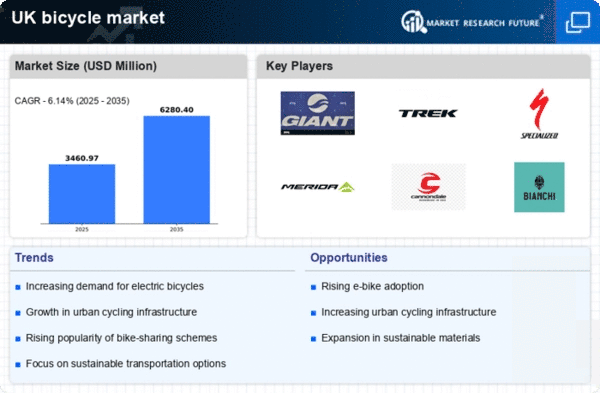Rising Fuel Costs
Rising fuel costs in the UK are contributing to a shift in consumer behavior, positively impacting the bicycle market. As petrol and diesel prices continue to escalate, many individuals are seeking cost-effective alternatives for their daily commutes. Cycling presents a financially viable option, allowing consumers to save on transportation expenses. Recent data indicates that the average cost of fuel has increased by over 10% in the past year, prompting more people to consider bicycles as a practical means of transport. This trend is likely to persist as economic pressures encourage a reevaluation of commuting habits. Consequently, the bicycle market stands to benefit from this shift, as more consumers opt for cycling to mitigate rising transportation costs.
Environmental Regulations
The bicycle market in the UK is increasingly influenced by stringent environmental regulations aimed at reducing carbon emissions. The government has set ambitious targets for lowering greenhouse gas emissions, which has led to a push for sustainable transport options. As a result, cycling is being promoted as a cleaner alternative to motor vehicles. Recent statistics indicate that the UK government aims to increase cycling participation by 50% by 2030, which could significantly impact the bicycle market. This regulatory environment encourages consumers to consider bicycles as a practical solution for short-distance travel, thereby driving demand. Additionally, the promotion of cycling through subsidies and incentives further supports this trend, making it an attractive option for environmentally conscious consumers.
Technological Advancements
Technological advancements are playing a crucial role in shaping the bicycle market in the UK. Innovations such as lightweight materials, improved gear systems, and smart technology integration are enhancing the overall cycling experience. For instance, the introduction of GPS-enabled bicycles and mobile applications for tracking performance has attracted tech-savvy consumers. Data suggests that the market for high-tech bicycles has grown by approximately 15% in the last year, reflecting a shift towards more sophisticated cycling solutions. As manufacturers continue to invest in research and development, the bicycle market is likely to see an influx of new products that cater to diverse consumer needs, thereby expanding its reach and appeal.
Urban Mobility Initiatives
The bicycle market in the UK is experiencing a notable boost due to urban mobility initiatives aimed at reducing traffic congestion and promoting sustainable transport. Local governments are investing in cycling infrastructure, such as dedicated bike lanes and secure parking facilities, which enhances the appeal of cycling as a viable commuting option. According to recent data, cycling trips in urban areas have increased by approximately 20% over the past year, indicating a shift in public transport preferences. This trend is likely to continue as cities prioritize eco-friendly transport solutions, thereby driving growth in the bicycle market. Furthermore, the integration of cycling into public transport systems is expected to further encourage this shift, making bicycles an integral part of urban mobility strategies.
Health and Fitness Awareness
The growing awareness of health and fitness among the UK population is significantly influencing the bicycle market. As individuals increasingly seek ways to incorporate physical activity into their daily routines, cycling emerges as an attractive option. Recent surveys indicate that nearly 30% of adults in the UK consider cycling a primary form of exercise. This trend is further supported by the rise of cycling clubs and community events that promote cycling as a healthy lifestyle choice. The bicycle market is likely to benefit from this heightened interest in fitness, as more consumers invest in bicycles for recreational and fitness purposes. Additionally, the emphasis on mental well-being and outdoor activities is expected to sustain this growth, as cycling offers both physical and psychological benefits.
















